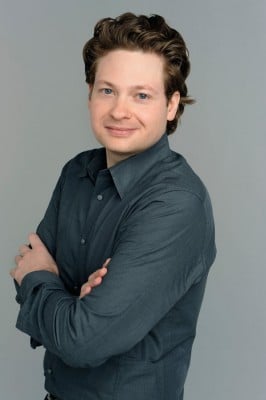
Senior VP of Programming
Company: Syfy
Location: New York, NY
I grew up just outside of Philadelphia, where I was a total film buff and television addict with a special love for science fiction. I always wanted to work in the media industry. At Rowan University, I studied film and television. There, I met a wonderful mentor, a professor named Mike Donovan, who taught me the business side of the business. He stressed often overlooked and untaught items like how to amortize a program. Donovan was also marketing director for NATPE [National Association of Television Program Executives], so he took me along as an intern back when it was still frenzied and fast-paced. He showed me how to network. I majored in communications, with a radio/TV/film specialization.
After graduation, I took a job at a Philadelphia TV station, WGTW, and found myself promoted to program director after three months. I was basically doing everything from designing ads to voicing promos, and I started buying programming and completely reinvented our morning block and all schedules from scratch. I was buying programming from distributors. One of them introduced me to a young network that was at the time called the Sci-Fi Channel. I started at Syfy 15 years ago as a director of programming and have worked my way up ever since.
The name change was obviously an important milestone. It happened in 2009. Syfy wasn’t just about science fiction anymore. We had branched out into horror, paranormal, and fantasy. The name change embraced the brand that we had evolved into. Under the leadership of Dave Howe, we’ve developed iconic scripted shows like Battlestar Galactica, and are continuing with hit shows like Defiance, Being Human, and our new series in 2014, Helix, as well as popular reality series like Face Off. To that, we’ve added original movies and other acquired hits, which is my area along with scheduling.
Syfy’s “acquired original” shows represent a way for us to tackle the marketplace in a new and unique way. We purchase completed shows like Lost Girl, Continuum, and Bitten from Canada and The Almighty Johnsons from New Zealand, and they debut in the United States on Syfy. This buying strategy enables us to bring more original content to our viewers instead of relying on repeats of off-network series which are often much more expensive. These shows are also highly serialized and better suited to SVOD [streaming video on demand] platforms, where people can binge watch them.
We produce 22 original movies a year. We have lots of fun with them and know we are making a guilty pleasure—films—but our viewers “get” it. Sometimes you catch lightning in a bottle with a great title like Sharknado. Add to that the right talent, social-media breakthroughs, and a lot of luck, and you have something special. That’s why we have Sharknado 2 coming out this year. We started making these movies in 2002, and have made more than 250 movies.

We recognize that a show must connect with our existing core audience, and scheduling is an important aspect of this in our digital, on-demand world. Scheduling is a combination of research, evaluating competition, wisdom from past experience, knowing your audience, and trusting your gut.
Television today is a fast-moving, competitive, challenging world. We’re delivering the best science fiction, horror, and fantasy that we can, and it’s more mainstream than ever before. Syfy is now part of the conversation. We’re here, and the future is limitless for us.

